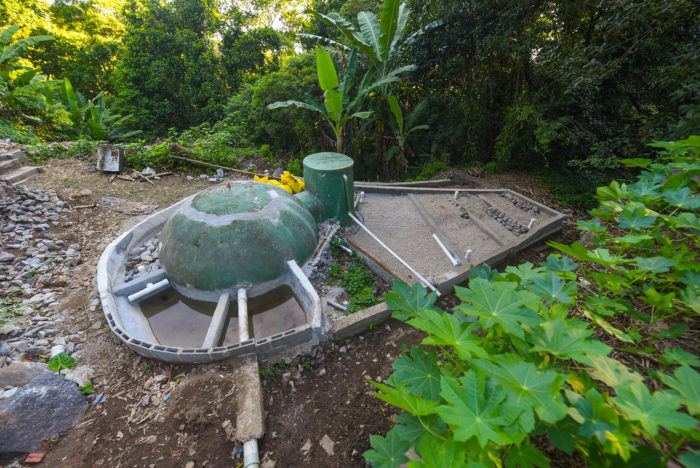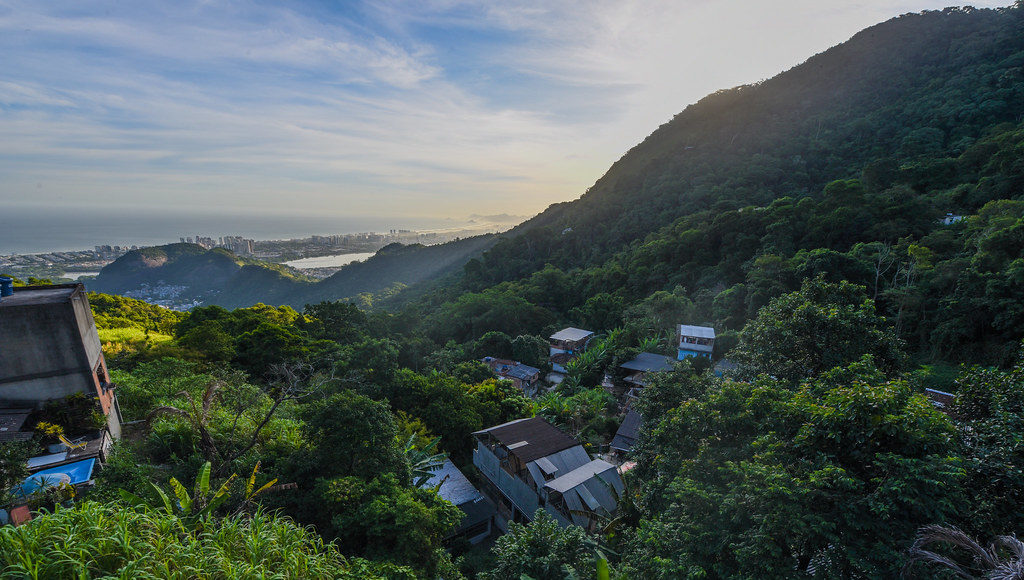The favela community of Vale Encantado in Rio de Janeiro are using a biosystem for sewage treatment and solar panels to make their neighbourhood economically and environmentally self-sufficient, while facing down a long-term threat of eviction.
Nestled in the Tijuca Forest in Rio de Janeiro’s north zone, the favela community of Vale Encantado was founded in the nineteenth century by coffee growers, and has grown slowly to house around 100 residents, who today live in 27 homes in the area. Recently, the community has been working on various projects to make their neighbourhood economically and environmentally self-sufficient, while facing down a long-term threat of eviction.
The local government is accusing the families of Vale Encantado of residing there unlawfully, and of causing environmental damage, citing the disorganized growth of the community as one of the justifications for evicting them from the area. Otávio Barros, the president of the Vale Encantado Cooperative and the Resident’s Association, claims that the community is being singled out, and there appears to be no justifiable reason: ‘They cite the disorganized growth of the community as one of the reasons for eviction. But the community doesn’t even have space to expand. I don’t understand what’s behind this.’
The threats of eviction have been hanging over the community since the mid 2000s and have understandably been causing anxiety and health problems for the residents. 71-year-old resident Adenir dos Santos says: ‘This is a good little place to live. We were born and raised here. But we’ve been losing sleep for 10 years. I had health problems before all this began, but now I only leave the house to go to the doctor. We’ve lost our sense of peace.’
In addition to the threat from the Public Prosecutor’s Office, sewage and waste disposal has been an endemic problem in the community. The sewage produced by the households had been deposited into makeshift holes in the ground, from which liquids seeped through and contaminated the soil. There was also an open stormwater channel running through the village, into which untreated sewage from both the neighbourhood and the apartment complex overlooking the favela was deposited and allowed to run into nearby springs, which themselves flow into the forest and a waterfall. These problems made life in the neighbourhood unsanitary, causing bad smells and attracting rats and cockroaches.
As the local government is not only unwilling to help them tackle the sanitation issues, but also working to evict them, the residents have self-organized to find long-term, sustainable solutions, with a focus on improving quality of life in the neighbourhood. In 2007, the Vale Encantado Cooperative was established to generate income and employment for the residents through several eco-projects in the community.
The Cooperative’s president Otávio Barros wanted to tackle the sanitation problem using green technologies, and also to create a self-sufficient community-based economy centered around ecotourism and the Cooperative’s restaurant, which serves vegetarian meals cooked by local residents using ingredients from the forest. To accomplish this, Otávio began researching which technologies could be employed and looking for possible partners.
Otávio wanted to deal with the sewage problem by building a pair of biodigesters, which would utilize sewage and food waste produced locally by converting it into biogas, which can be used in place of fossil fuel gas. The first biodigester was built in 2014 to serve the Cooperative’s restaurant. It utilizes food waste from the kitchen, which is broken down with bacteria. This process generates biogas, fertilizer, and liquid fertilizer. The biogas generated from this process is then piped back to the restaurant’s kitchen for cooking.

A second biodigester was planned for construction in 2015 through a new partnership with researchers from Rio’s Catholic University. This biodigester will be capable of treating the sewage of every home in Vale Encantado, although only five houses have been connected so far. The Sustainable Favela Network (SFN), through its managing organization Catalytic Communities, and the German NGO Viva Con Agua, have attracted the funding and other resources to finish connecting all the homes to the biodigester. This, along with technical support from Taboa Engenharia, means that as of 4 June 2022, all of the buildings in the favela will have their sewage safely and sustainably treated within the community itself.
The Taboa Engenharia has also trained local residents in installing hydro-sanitary infrastructure, and the residents were paid to construct the system, fulfilling the goals of the Cooperative. In addition to this, residents were also trained to install six solar arrays onto the roof of the Cooperative building (collections of multiple solar panels that generate electricity as a system). Solarize Trainings, a business that promotes solar energy courses in Brazil, helped the community to install the panels, as well as a solar water heater.
The success of the projects demonstrate that the community is having a positive impact on the ecology of the surrounding area and is far from damaging to the environment. Otávio says that he hopes that the local government will pay attention to these projects and understand that this work has had a positive impact on the health of the Tijuca Forest: ‘We hope that with all of these projects being developed, [policymakers] will have a different outlook and stop pinning us as an environmentally harmful community. On the contrary, if you take photos from 1985, 1990, and 2005, you’ll see the forest’s growth.’
However, the Public Prosecutor’s Office has informed the resident’s association that they will visit the area to check if the community is damaging the local environment. Otávio says: ‘We’re distrustful. This is not a place for winning votes, like communities the size of Rocinha are. We don’t have a voice,’ he claims. The Press Office of the Public Prosecutor’s Office would not comment further on the matter.
Despite threats from the local government, Otávio remains optimistic and has ambitions to build on the success of the projects. The aim is to lead Vale Encantado on its mission to become fully sustainable and independent, with the biodigesters working at full capacity and integrated into a plan to generate jobs and income for the residents: ‘My dream is that this place may one day become a tourist spot to generate income for our most vulnerable families.’

